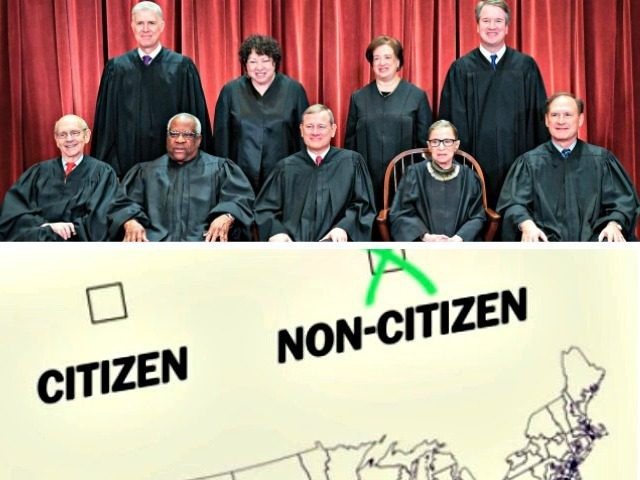WASHINGTON, DC – The Supreme Court will decide whether the 2020 census can ask every person in America if they are a U.S. citizen, granting review Friday on a legal challenge to that question and bypassing the federal appeals court in an extremely rare move not seen in many years.
The Constitution commands in Article I, Section 2, that every ten years the U.S. government will conduct a nationwide census, and that congressional seats will be apportioned among the states based on those numbers. The Constitution mentions the census again in Article I, Section 9, Clause 4.
The Supreme Court long ago handed down a series of cases holding that the Equal Protection Clause of the Constitution’s Fourteenth Amendment requires that every state and federal legislative district within each state must represent the same number of people. The Court characterized this rule as, “One person, one vote.” Those district lines are likewise based on census data.
But if that means equal political representation, then some argue that each lawmaker should represent an equal number of American citizens, rather than all persons – which include aliens, both legal and illegal. In 2016, the Supreme Court in Evenwel v. Abbottleft answered the question of whether states could draw their district lines based on citizenship instead of total population until a state took that option and someone challenged it in court.
Given that district lines must be based on census numbers, no state could ever try such an option if the census cannot ask if each person it is counting is a citizen.
The census in the past frequently asked if each person was a citizen. The 1820 census was the first to do so, and the most recent one was 1950.
However, a liberal judge in the U.S. District Court for the Southern District of New York ruled that it was illegal for the census to ask such a question. The U.S. Department of Justice appealed that decision to the U.S. Court of Appeals for the Second Circuit, but the case has not yet been heard.
There are also at least two other lawsuits in other parts of the nation also challenging the citizenship question, including Maryland and California.
But there is a problem: In order to print tens of millions of census forms for 2020, the government must start printing those forms by July 2019. No matter how fast the Second Circuit moved, the Supreme Court would have been done hearing cases until October, long after the forms must be finalized.
U.S. Solicitor General Noel Francisco therefore took the extremely rare step of asking the U.S. Supreme Court to grant certiorari before judgment. The Supreme Court always waits until a federal appeals court renders a final decision before considering a petition to review a matter, which is called a petition for a writ of certiorari.
But under federal law and Supreme Court rules, the justices have jurisdiction to hear any federal appeal at any stage of the appeal, and does not need to wait for the court to issue a written decision. These rules generally exist only for emergency situations.
On Friday, the Supreme Court granted “cert before judgment” in the census case, bypassing the Second Circuit. The Court announced that it will hold arguments the last week of April, so that it can issue a decision by the end of June.
The most recent time the justices granted cert before judgment was in 2003 and 2004, but only for cases where the Court had already taken up a legal issue, and the second case (for which the appeals court had not yet rendered a decision) raised some version of the issue that the justices thought they should add into the mix.
According to a quick search, it appears the Court has not granted cert before judgment in a case like this – one where it is not paired with an ordinary petition after the appeals court judgment – in decades.
The case is Department of Commerce v. New York, No. 18-966 in the Supreme Court of the United States.
Ken Klukowski is senior legal editor for Breitbart News. Follow him on Twitter @kenklukowski.

COMMENTS
Please let us know if you're having issues with commenting.